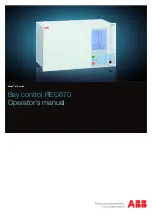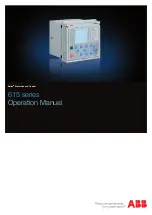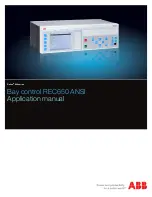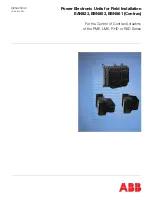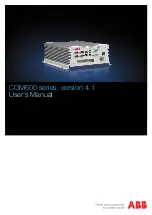
SINAMICS G120 CU250S-2 Control Units
List Manual, 09/2017, A5E33842890
299
2 Parameters
2.2 List of parameters
p1900 = 2:
Sets p1910 = 1 and p1960 = 0
When the drive enable signals are present, a motor data identification routine is carried out at standstill with the next
switch-on command. Current flows through the motor which means that it can align itself by up to a quarter of a
revolution.
p1900 = 3:
Sets p1960 = 0, 1 depending on p1300
This setting should only be selected if the motor data identification was already carried out at standstill.
When the drive enable signals are present, with the next switch-on command, a rotating motor data identification
routine is carried out - and in addition, speed controller optimization by taking measurements at different motor
speeds.
Value:
0:
Inhibited
1:
Identifying motor data and optimizing the speed controller
2:
Identifying motor data (at standstill)
3:
Optimizing the speed controller (in rotating operation)
Dependency:
Refer to: p1300, p1910, p1960
Refer to: A07980, A07981, F07983, F07984, F07985, F07986, F07988, F07990, A07991
Notice:
p1900 = 3:
This setting should only be selected if the motor data identification was already carried out at standstill.
If there is a motor holding brake, it must be open (p1215 = 2).
To permanently accept the determined settings they must be saved in a non-volatile fashion (p0971).
During the rotating measurement it is not possible to save the parameter (p0971).
Note:
The motor and control parameters of the vector control are only optimally set when both measurements are carried
out (initially at standstill, and then with the motor rotating). The measurement with rotating motor is not performed for
p1300 < 20 (U/f controls).
An appropriate alarm is output when the parameter is set.
The switch-on command must remain set during a measurement and after the measurement has been completed,
the drive automatically resets it.
The duration of the measurements can lie between 0.3 s and several minutes. This time is, for example, influenced
by the motor size and the mechanical conditions.
p1900 is automatically set to 0 after the motor data identification routine has been completed.
If a reluctance motor has been parameterized, a pole position identification is carried out during the stationary
measurement. As a consequence, faults that occur can also be assigned to the pole position identification.
For U/f control (p1300), identification with speed controller optimization does not make sense (e.g. P1900 = 1).
Description:
Sets the configuration for the test pulse evaluation.
Bit 00: Check for conductor-to-conductor short circuit once/always when the pulses are enabled.
Bit 01: Check for ground fault once/always when the pulses are enabled.
Bit 02: Activation of the tests selected using bit 00 and/or bit 01 each time the pulses are enabled
Recommendation:
If the ground fault test is incorrectly initiated because the motor is not at a complete standstill, then the pulse
cancellation delay time (p1228) should be increased.
Dependency:
The ground fault test is only possible when the motor is stationary, and is therefore only realized when flying restart is
deactivated (p1200 = 0).
Refer to: p0287
p1901
Test pulse evaluation configuration / Test puls config
Access level:
3
Calculated:
p0340 = 1
Data type:
Unsigned32
Can be changed:
T
Scaling:
-
Dyn. index:
-
Unit group:
-
Unit selection:
-
Func. diagram:
-
Min Max
Factory
setting
- - 0000
bin
Bit field:
Bit
Signal name
1 signal
0 signal
FP
00
Phase short-circuit test pulse active
Yes
No
-
01
Ground fault detection test pulse active
Yes
No
-
02
Test pulse at each pulse enable
Yes
No
-
































